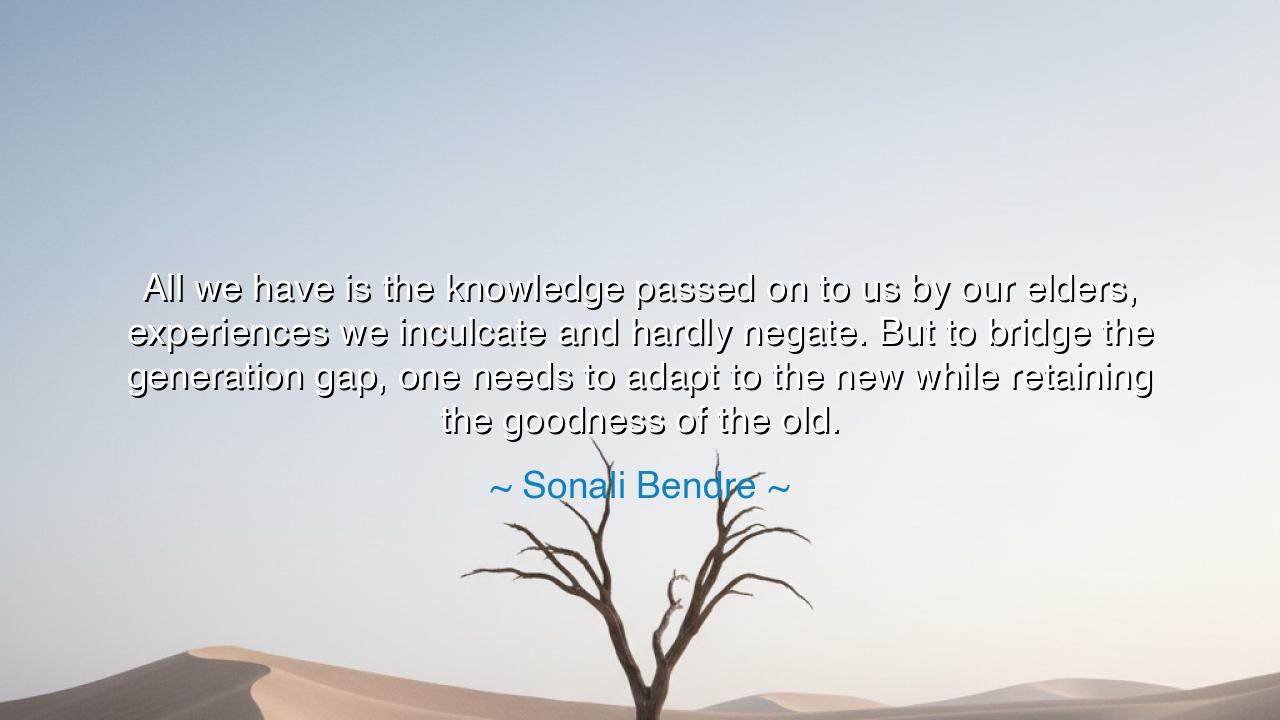
All we have is the knowledge passed on to us by our elders
All we have is the knowledge passed on to us by our elders, experiences we inculcate and hardly negate. But to bridge the generation gap, one needs to adapt to the new while retaining the goodness of the old.






Hear the words of Sonali Bendre, words soft yet weighty with wisdom: “All we have is the knowledge passed on to us by our elders, experiences we inculcate and hardly negate. But to bridge the generation gap, one needs to adapt to the new while retaining the goodness of the old.” In this saying, she gathers the eternal struggle of mankind—the tension between tradition and change, between the wisdom of the past and the demands of the present. For every generation inherits the treasure of memory, yet must also forge a path into the unknown future. The secret of harmony lies not in rejecting one for the other, but in weaving them together into a fabric that endures.
The ancients themselves honored this truth. The Greeks revered their forefathers, yet they also embraced the new learning of philosophy, marrying Homer’s epics with Plato’s reason. The sages of India preserved sacred texts, yet added to them commentary and reform. The builders of every civilization stood on the shoulders of their elders, yet stretched their hands toward horizons never before seen. For without roots, the tree cannot stand, but without new branches, it cannot grow.
Yet how often does the generation gap tear families, communities, even nations apart? The young look upon the old as relics, bound by customs no longer useful. The old look upon the young as reckless, throwing away treasures that took centuries to gather. In this conflict, wisdom is lost, and pride takes its place. Bendre’s words are a call to humility: for the young to listen, for the old to adapt, and for both to meet on the bridge between memory and innovation.
Consider the story of Japan after the Second World War. The nation was shattered, yet it did not abandon its traditions. The people preserved their reverence for honor, discipline, and artistry, while also embracing the knowledge and technology of the modern world. By blending the old with the new, they rose from ruin to become one of the strongest nations of their age. Had they clung only to the past, they would have remained stagnant; had they cast it aside entirely, they would have lost their soul. Their triumph came through the marriage of tradition and progress.
This is the essence of Bendre’s counsel: adapt without betrayal, innovate without arrogance. To learn from elders is to anchor oneself in time-tested truths—patience, respect, gratitude, resilience. To embrace the new is to remain alive, responsive to change, open to the winds of possibility. The one who clings only to the past grows rigid and brittle; the one who worships only the new becomes rootless and shallow. But the one who binds both together builds a path strong enough to carry generations forward.
The lesson is clear: we must not despise what we inherit, nor fear what is coming. We must retain what is good and shed what is harmful, just as the gardener prunes the tree—not to kill it, but to make it bear more fruit. This requires discernment, patience, and above all, humility: the humility to learn from those who came before, and the humility to accept that the world must change.
What then must you do? Honor the wisdom of your parents and teachers, for their lives are scrolls written with experience. Yet do not be afraid to question, to refine, to reshape what no longer serves truth. Walk neither in blind obedience nor reckless rebellion. Instead, walk as a bridge-builder: taking the treasures of the past in one hand, and the tools of the present in the other, so that the future may be built upon both.
Therefore, remember Sonali Bendre’s words. All that we have is the knowledge passed down, but it is not enough to receive it—we must also adapt it, shape it, and carry it forward. To bridge the generation gap is to honor the river of time itself, so that wisdom flows without breaking, from the elders to the youth, and from the youth to those yet unborn. For in this harmony lies the strength of families, the survival of nations, and the flourishing of all mankind.






AAdministratorAdministrator
Welcome, honored guests. Please leave a comment, we will respond soon